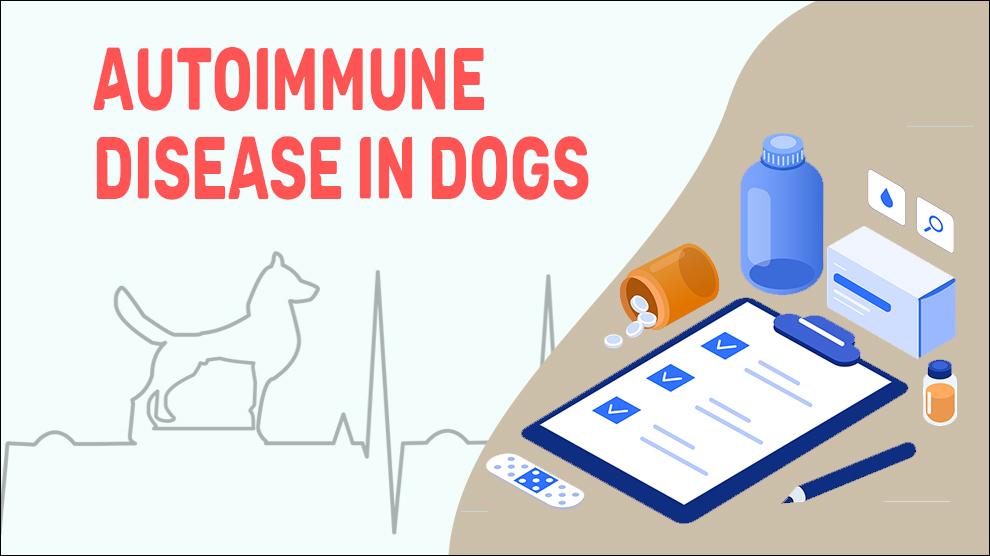What is Autoimmune Disease In Dogs?
In veterinary medicine, autoimmune diseases are often referred to as an ‘immune-mediated’ diseases (for example, Immune-Mediated Polyarthritis or joint inflammation).
The term “autoimmune disease” in dogs covers a range of disorders that can affect a single bodily system (organ-specific) or it can affect a number of them (systemic).
They can be classified into ‘primary’, with genetic of no identified cause, or ‘secondary’ to a trigger such as infections, exposure to chemicals, or cancer. Autoimmune diseases in dogs have a strong genetic basis with higher rates in particular pure breeds.
Canine autoimmune diseases mean the dog’s immune system has gone haywire and attacks the body’s own cells and tissue.
An autoimmune disorder can be life-threatening to dogs and may require long-term or lifelong treatments
Symptoms Of Autoimmune Disease In Dogs
There are several types of autoimmune diseases in dogs with various symptoms.
For Immune-Mediated Thrombocytopenia:
Symptoms can include:
- Low platelet count
- Lethargy
- Anorexia with mildpyrexia
- Small sites of bleeding on the skin and gums called petechiae
- Nose bleeds or from mouth
- Blood in stool or black stool
- Blood in urine
For Immune-Mediated Polyarthritis:
- Lameness or altered gait
- Weight loss
- Joint swelling or painful joints
- Loss of appetite
- Anorexia
- Fatigue
Treatment Options For Autoimmune Disease In Dogs
In general, the objective of treatment/management of the autoimmune disease is based on efforts directed at either control of the induction (affector) part of the immune response, OR control of the inflammation (effector phase) and/or maintenance period.
Control of the induction (affector) part of the immune response:
This is focused on interrupting the normal production of the clone of lymphocytes that is liable for the production of antibodies or cytokines directed against normal tissue. Examples - cytotoxic drugs, (alkylating agents, antimetabolites, free radical generators, and mitotic inhibitors)
Control the inflammation (effector phase) and/or maintenance period:
Aggressive treatment is provided (depending on severity) for affector phase, then after induction is attained, the medications will retreat as soon as possible. The drawback is aggressive therapy may lead to undesirable side effects; however, once induction is reached, treatment is more focused on maintenance of equilibrium state and control of inflammation. In many situations, however, autoimmune disease is treated on an outpatient basis.
Home Remedies For Autoimmune Disease In Dogs
In addition to medication, home remedies are provided as supportive treatment for autoimmune disorders in dogs.
Discuss the effectiveness of additional treatments with your vet to ensure they’re won’t mess with other medications. This may include dietary changes, exercise, supplements to administer, hydrotherapy, acupuncture and other holistic treatments.
How to Prevent Autoimmune Disease In Dogs?
As of now, the exact cause of every autoimmune disease is not known and every condition is unique. There is no definite way to stop the onset of autoimmune disease in dogs.
However, by addressing a few root issues that are suspected to play a role in the autoimmune process, there is a possibility that the risk of autoimmunity may be reduced.
- Address any underlying digestive issues - when the gut is impaired or injured, it can directly influence the immune system
- Chronic stress - stressful dogs are more likely to be affected with an autoimmune disease
- Environmental triggers- reduce the Exposure to environmental toxins as they are responsible for nearly 70% of autoimmune diseases. The most important environmental toxins are heavy metals, asbestos, and chlorinated solvents BPA plastic, mercury, and asbestos.
- Dietary triggers - foods that trigger a reaction in the immune system or gut.
- Celiac disease - avoid wheat, rye, and barley
- Genetic triggers- Always check for dogs’ genetic background and look for any inherent risk for any familial autoimmunity.
Affected Dog Breeds Of Autoimmune Disease
There are several autoimmune diseases in dogs.
For instance,
Systemic lupus erythematosus (SLE)
Certain breeds are more prone to the condition.
- German Shepherd
- Poodle
- Beagle
- Afghan Hound
- Collie
- Old English Sheepdog
- Shetland Sheepdog
- Irish Setter
Immune-mediated hemolytic anemia
- Cocker Spaniel
- Labrador Retriever
- English Springer Spaniel
- Doberman Pinscher
- Vizsla
- Scottish Terrier
- Miniature Schnauzer
Additional Facts For Autoimmune Disease In Dogs
The most common autoimmune diseases in dogs are:
- Immune-Mediated Thrombocytopenia (platelet destruction)
- Immune-Mediated Polyarthritis (joint inflammation)
- Keratoconjunctivitis Sicca (Dry eye syndrome)
- Inflammatory brain disease (meningoencephalitis)
- Pemphigus Foliaceus (benign variety of pemphigus)
Causes:
- Genetic predisposition
- Infections such as tick-borne infections
- Drugs/medications
- cancer
When To See A Vet For Autoimmune Disease In Dogs?
The sine qua non to the recovery and management of your dog’s autoimmune disease lies in the severity of the condition and specific diagnosis obtained by your vet. This could be a potentially serious situation for the dog and you should also anticipate that there will be long-term, extensive follow-up care and treatment.
Dog Food Suggestions For Autoimmune Disease
Dietary management is also disease-specific in autoimmune diseases
In general,
- Choose a wholesome food, minimally-processed, that is free of preservatives, chemicals, hormones, and other toxic additives. Keep away from butylated hydroxyanisole (BHA) and ethoxyquin.
- An allergen-free (hypoallergenic) balanced diet ( check for thickeners, coatings, flavors)
- Try an elimination diet after food sensitivity testing. Many prescribed medications for an autoimmune disease can cause GI and non-GI woes.
- Consider a diet with all essential nutrients and also provides plenty of antioxidants (combat free radicals)
- Consider a probiotic supplement with added support for the liver
Conclusion
You cannot prevent an autoimmune disease from developing. But, you can reduce the risk of your pet’s autoimmunity by taking small steps to support their immune system. Always take necessary steps as per the vet’s direction to manage the symptoms and flare-ups.
A dog’s autoimmune disease may be rarely curable; however, it is definitely manageable if suitable care and medical attention are provided.

















